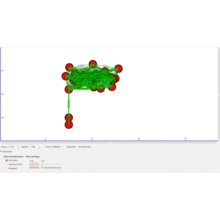Tag Archive: 'ns3 projects'
The growing volumes of time-stamped data available from sensors, social media sources, Web logs, and medical histories present remarkable opportunities for researchers and policy analysts. Although big data resources can provide valuable insights to help us understand complex systems and lead to better decisions for business, national security, cybersecurity, and healthcare, there are many challenges to dealing with […]
Self-organizing dense sensor networks are expected to resolve the challenges of spectral efficiency, energy efficiency, and device management. This paper explores the use of information dependence among sensors to form a community structure of sensor data, and uses this structure to develop an information- centric processing methodology to achieve self-organizing dense sensor networks. Moreover, a data aggregator adopts ℓ1 regularization to easily enhance energy efficiency […]
The Internet of Things (IoT) idea is having a significant impact on our daily lives these days. As the number of IoT devices is growing fast, many researchers have declared that the usage of IoT and the impact of IoT will make people always use IoT devices whatever they do or wherever they are. At […]
While personal information privacy is threatened by online social networks, researchers are seeking for privacy protection tools and methods to assist online social network users. In this paper, we propose a Trust-Aware Privacy Evaluation framework, called TAPE, aiming to address this problem. Under the TAPE framework we investigate how to quantitatively evaluate the privacy risk, as a function of people’s […]
The growing size of cities and increasing population mobility have determined a rapid increase in the number of vehicles on the roads, which has resulted in many challenges for road traffic management authorities in relation to traffic congestion, accidents, and air pollution. Over the recent years, researchers from both industry and academia have been focusing […]
Although previous bio-inspired models have concentrated on invertebrates (such as ants), mammals such as primates with higher cognitive function are valuable for modeling the increasingly complex problems in engineering. Understanding primates’ social and communication systems, and applying what is learned from them to engineering domains is likely to inspire solutions to a number of problems. This paper […]
Increasing population density, closer social contact and interactions make epidemic control difficult. Traditional offline epidemic control methods (e.g., using medical survey or medical records) or model-based approach are not effective due to its inability to gather health data and social contact information simultaneously or impractical statistical assumption about the dynamics of social contact networks, respectively. In addition, it is challenging to find […]
Self-awareness facilitates a proper assessment of cost-constrained cyber-physical systems, allocating limited resources where they are most needed. Together, situation awareness and attention are key enablers for self-awareness in efficient distributed sensing and computing networks.
In this paper, we consider the problem of social learning in a network of agents where the agents make decisions onK hypotheses sequentially and broadcast their decisions to others. Each agent in the system has a private observation that is generated by one of the hypotheses. All the observations are independently generated from the same hypothesis. We study a […]
Obesity is one of the rise and among the top health risk factors in the world affecting people of all ages. It can lead to many problems including increased risk of cardiovascular disease, diabetes, functional limitations, and disabilities which adversely affect the social and physical abilities of the obese person in daily affairs. While the rising trend […]

 Click Here to watch our latest output video using NS3 simulator
Click Here to watch our latest output video using NS3 simulator  Click Here to watch our latest projects screenshots using NS3 simulator
Click Here to watch our latest projects screenshots using NS3 simulator